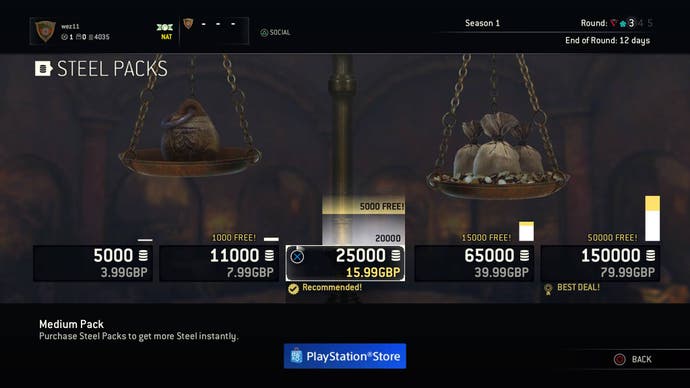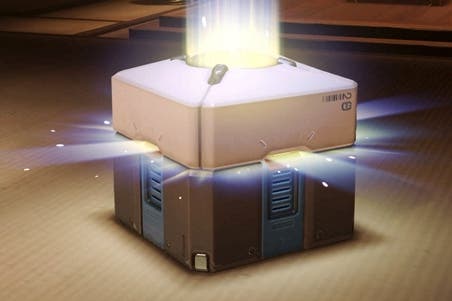The year in loot boxes
The empire strikes back.
The great Star Wars debacle - and I'm not talking about The Last Jedi's second act here - dominated video game headlines in the last quarter of 2017. But in truth the year was packed with depressing stories about loot boxes, so many in fact that it has at times felt like our beloved hobby was more about the chance to win a rare item than it was about the chance to play.

It all began with For Honor, Ubisoft's excellent but troubled melee combat game. Soon after For Honor came out in February, a redditor worked out how much money it would cost to unlock all 12 heroes in the game and their associated aesthetic items (2017 would see enterprising redditors work out how much things cost to unlock in a lot of games). It turned out it would cost an eye-watering £585. Ouch.
Ubisoft, sensing a growing resentment among players (growing resentment was a running theme of 2017), said it never intended for players to unlock everything in the game. That was a PR line that didn't go down well (PR lines that didn't go down well was another running theme of 2017).
The vociferous debate surrounding For Honor's progression was 2017's first step on the road to a full-on furore around loot boxes, and the realisation that more and more video game publishers were shoehorning exploitative microtransactions into full-price games.
Publisher Warner Bros., which is now overshadowed by EA as public enemy number one but for a good portion of 2017 was glared at by the gaming community's collective eye of Sauron, released Injustice 2 in May and with it a controversial gear system that added loot to the otherwise superb fighting game. Loot in a fighting game! Gear came with stats, which gave you an edge. Was it pay-to-win? It sure sounded like it.
It turned out Injustice 2 avoided a PR debacle because it included a competitive mode which let both players agree to toggle gear stats on or off. It was the game's saving grace, although I'm still surprised it didn't kick up more of a stink. Never mind. Warner Bros. would right that unwanted wrong just a couple of months later.
In August, Warner Bros. announced Middle-Earth: Shadow of War would have loot boxes. Yes, Warner announced loot boxes, like they were some cool new feature for the game. The single-player action adventure, Warner signalled, would have an in-game store, called the Market, from which players could buy orcs and loot chests - in a full-price single-player game.
Ahead of the launch of the game, we quizzed design director Bob Roberts on the inclusion of microtransactions in Shadow of War, asking, why put them in at all? His response? To save people time. They're optional, he stressed.
Again, that didn't go down too well with players, and Shadow of War launched under a cloud of discontent (another running theme of 2017). Shadow of War players started using tricks and cheats to combat the game's loot boxes. They still are.
Destiny 2 got in on the controversial loot boxes act because of course it did. Players felt Bungie had crossed a line by making shaders consumables in Destiny 2, whereas in Destiny 1 they were not. One of the ways you can get shaders in Destiny 2 is by buying blind loot boxes from the Eververse Trading Company with the in-game currency you buy with real-world cash. Yay.
The Eververse Trading Company has been the subject of much discussion since Destiny 2's September release. Players found out Destiny 2 was cheating them out of experience points, which was important because you get a free loot box-style bright engram every time you level up (Bungie admitted it messed up, another running theme of 2017). The game's coolest cosmetic items, such as weapon and armour skins, are exclusive to the shop. Poor Tess. She's not the most popular person in the Tower.
Up to this point, all the fuss over microtransactions and loot boxes had remained relatively confined to video game websites and industry watchers on Twitter. But something happened this year to make loot boxes hit the mainstream, and it began around October, with a petition.
Normally, we roll our eyes at video game petitions, but this one was different. This one picked up on the idea that loot boxes in video games are gambling - and following that logic, were inappropriate mechanics for children to engage with. This petition, submitted to parliament, called on the government to adapt gambling laws to include gambling in video games which target children.
This sparked a question: are loot boxes gambling? We investgated the issue in a feature that included comment from a raft of sources, such as the UK's Gambling Commission. The Gambling Commission said nope, loot boxes are not gambling, because you can't cash out in-game (this position seemingly ignored the fact that you can cash-out out of the game).
Online sentiment reached a tipping point, and the petition hit the 10,000 signatures mark required to force a response from government. That response included an assurance that the Video Standards Commission (VSC) rating board was working with PEGI "to determine whether any changes to the PEGI criteria need to be made". A fob off or progress? Either way, video game loot boxes were now mainstream. The issue was blowing up, and people in positions of power were starting to notice.
And then Star Wars happened.
These days, video game betas are little more than promotional demos. Publishers will say they're stress testing servers and working out progression and balance and all that, but in truth betas are designed to give people a taste that sparks a pre-order and then, hopefully, a sale. Unfortunately, Star Wars Battlefront 2's beta did not work out like that. In fact, it had the opposite effect.
In October we reported Star Wars Battlefront 2 had a loot crate problem. The game's beta revealed the only way to get new abilities and weapons was from opening loot crates, bought either with in-game currency or real-world currency or gifted to you. Star Wars was, quite literally, pay-to-win.
It didn't matter how well-balanced Battlefront 2 was. It didn't matter whether those who didn't pay could use their old-school shooting skill to dominate those who did pay. The fact was, you could pay for an advantage in multiplayer, and that was not cool. Not cool at all.
The uproar was swift and devastating. Forums burned with rage. Comments sections burst with vitriol. The floodgates had opened. How could EA do such a thing in a full-price game? How could EA do such a thing to Star Wars? Our beloved Star Wars? You were the chosen one! It turned out, you were only the chosen one if you spent money on loot boxes. Merry Christmas!
It got worse. It transpired that Star Wars Battlefront 2's heroes were locked behind the game's confusing progression system. Reports online suggested it would take an eye-watering 40 hours of play to unlock Darth Vader and Luke Skywalker, two of the most iconic Star Wars heroes. That 40 hour figure was overblown, but again it didn't matter. The fact you had to spend time unlocking access to them at all was seen as a kick in the teeth. What was Battlefront 2? It felt like a free-to-play game wrapped in full-price clothing.
The Star Wars debacle sparked an about-turn from EA, which must have sensed a great disturbance in Battlefront 2's pre-order numbers. Developer DICE announced small changes to the game based on feedback to the beta, but it didn't look like much would change at all. Star Wars Battlefront 2 came out a week early for EA Access and Origin subscribers, and players raged in a way we hadn't seen since Microsoft's disastrous unveiling of the Xbox One. What should have been a cause for celebration was a disaster for pretty much everyone involved.
Then something remarkable happened: the day before Battlefront 2's full release, EA announced it would turn off the game's microtransactions. No compromise. No wiggle room. They were snuffed out, and millions of investors suddenly cried out in terror.
It later emerged that Disney bosses, no doubt furious that brand Star Wars was being dragged through the mud on CNN ahead of the release of The Last Jedi, had phoned up EA boss Andrew Wilson to... discuss the lively debate around the game made by the company they had licensed their precious Star Wars franchise to. Oh, to be a fly on the wall for that conversation!
EA's PR nightmare continued. The Dutch Gambling Authority launched an investigation into whether games with loot boxes should be considered games of chance. That followed the announcement that the Belgian Gaming Commission was investigating whether loot box systems used in Star Wars Battlefront 2 and Overwatch qualified as gambling. Then, later in November, my all-time favourite loot box-related quote, from down-with-the-kids Democrat politician Chris Lee: "This game is a Star Wars-themed online casino designed to lure kids into spending money; it's a trap."
It's a trap!
EA PR was forced to address the question, insisting "the crate mechanics of Star Wars Battlefront 2 are not gambling. A player's ability to succeed in the game is not dependent on purchasing crates. Players can also earn crates through playing the game and not spending any money at all. Once obtained, players are always guaranteed to receive content that can be used in game".
As 2017 comes to an end, the furore around loot boxes has dampened somewhat. Perhaps there's a touch of loot box fatigue setting in. Perhaps Christmas cheer is finally working its way into our hearts and mind. But the debate is sure to spark back into life in 2018 when EA inevitably turn Star Wars Battlefront 2's microtransactions back on, and the Empire strikes back.
Until then, it's worth spending a moment to reflect upon the year in loot boxes. What an exhausting, fascinating, drama-filled year it's been. Not everything around loot boxes has been an unmitigated disaster (I still think Activision was kind of genius to have Call of Duty: WW2 loot boxes drop from the sky onto Normandy beach and open in front of other players), but it's clear the industry is struggling to work out how to make extra money from its biggest video games without pissing a hell of a lot of people off. In a post-season pass world, at a time when video game development costs are spiralling out of control, investors demand alternative revenue streams. Will big publishers continue to strangle the life out of the games they make in the name of extra revenue? Or will 2017 serve as proof that publishers are, ultimately, beholden to their players?
As General Leia Organa would say, there's always hope.











